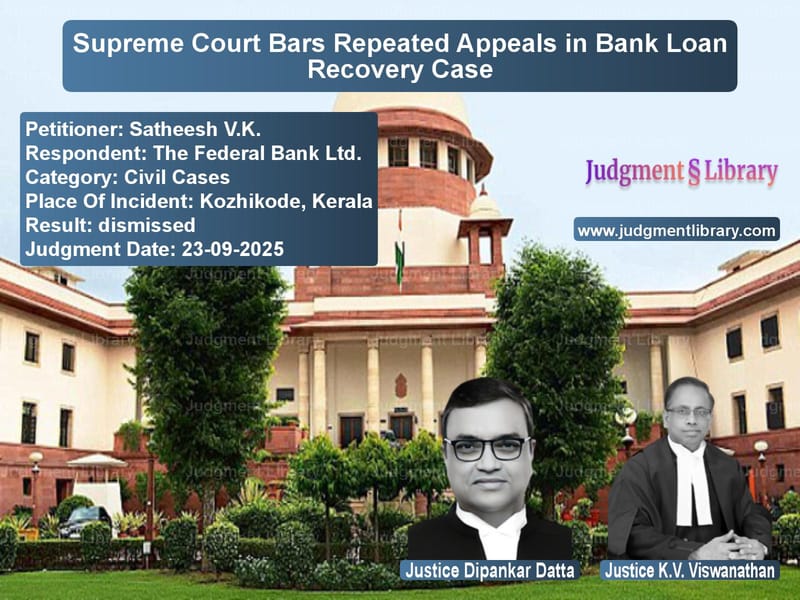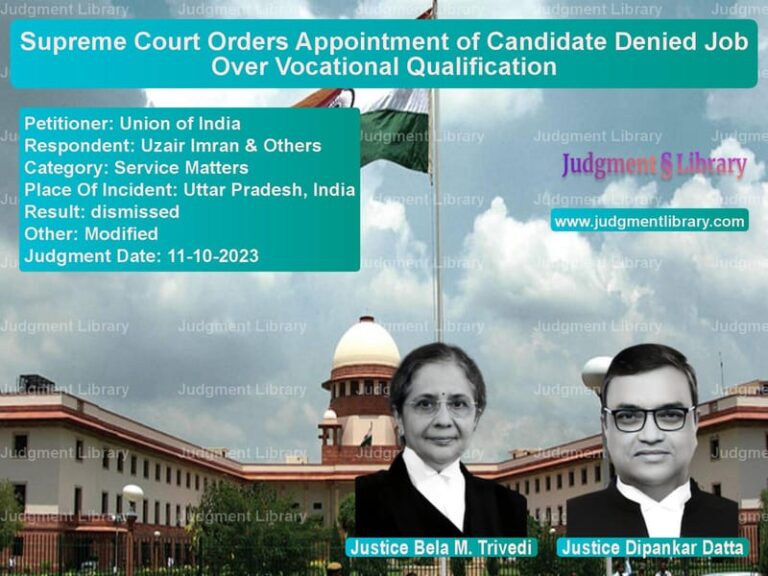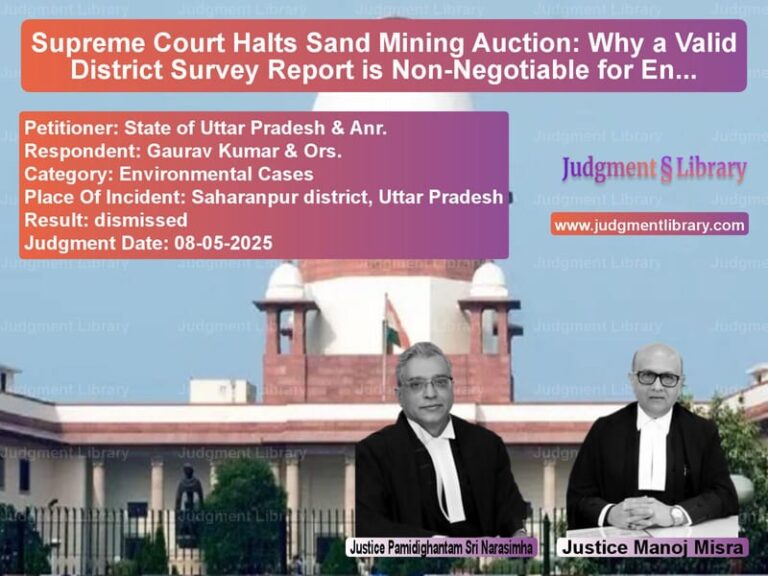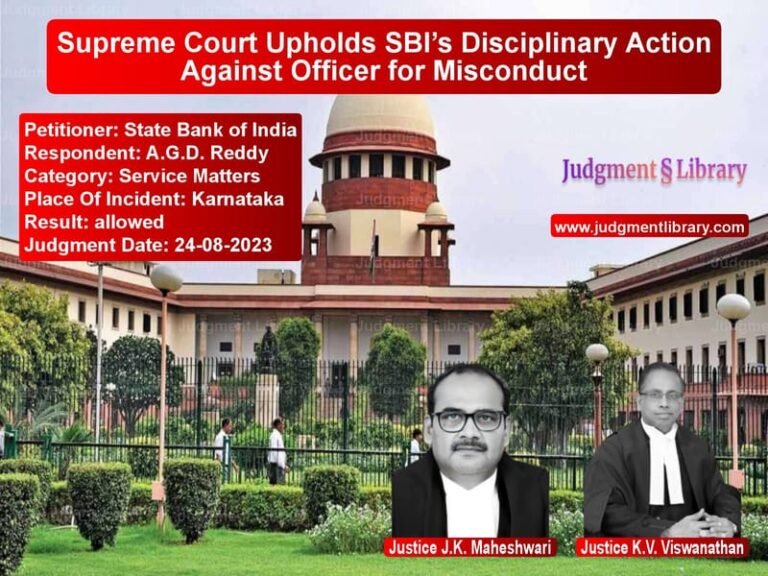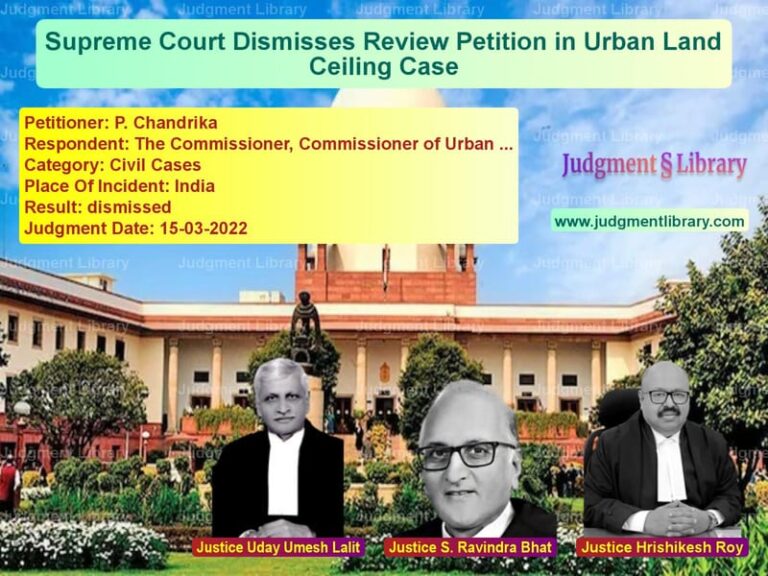Supreme Court Bars Repeated Appeals in Bank Loan Recovery Case
In a landmark judgment that reinforces the principle of finality in litigation, the Supreme Court of India has firmly shut the door on borrowers attempting to repeatedly challenge the same court order through multiple legal petitions. The case of Satheesh V.K. versus The Federal Bank Ltd., decided on September 23, 2025, serves as a crucial precedent against the abuse of legal process in bank recovery cases. The judgment delivered by Justices Dipankar Datta and K.V. Viswanathan emphasizes that the judiciary cannot be used as a tool for delaying legitimate recovery proceedings by financial institutions.
The legal battle began when Satheesh V.K., a borrower who had taken a loan from Federal Bank by mortgaging properties in Kozhikode, defaulted on his repayment obligations. The bank classified his loan account as a Non-Performing Asset (NPA) and initiated recovery proceedings under the SARFAESI Act, 2002. The borrower’s outstanding amount was a substantial Rs. 7.77 crores, prompting the bank to take legal measures to recover its dues.
When the matter reached the Kerala High Court, the court passed a balanced order on October 1, 2024, giving the borrower a reasonable opportunity to repay. The High Court directed him to pay Rs. 2 crores by October 30, 2024, and the remaining amount in twelve equal monthly installments. The order clearly stated that if the borrower failed to make any payment, the bank would be free to proceed with recovery under the SARFAESI Act. This should have been the end of the matter, but the borrower had other plans.
Instead of complying with the High Court’s order, Satheesh V.K. approached the Supreme Court through a special leave petition. However, during the hearing on November 28, 2024, after arguing for some time, his counsel sensed the Court’s reluctance to entertain the petition and sought permission to withdraw it. The Supreme Court recorded this development in its order, stating: “After arguing for some time and on our expressing reservation in entertaining the present petition, the learned senior counsel for the petitioner seeks permission to withdraw the present petition. Permission to withdraw is granted. The Special Leave Petition is dismissed as withdrawn.”
This voluntary withdrawal became the turning point in the case. Rather than accepting this outcome, the borrower filed a review petition before the Kerala High Court, seeking reconsideration of the same October 1, 2024 order. When the High Court dismissed this review petition on December 5, 2024, the borrower returned to the Supreme Court with two fresh civil appeals – one challenging the original High Court order and another challenging the dismissal of his review petition.
The bank, represented by Mr. Aljo K. Joseph, strongly objected to this second attempt. He argued that “no liberty having been sought and/or granted by this Court to present a fresh special leave petition to lay a challenge to the order dated 1st October, 2024, the appellant has no right in law to approach this Court once again after withdrawing the initial challenge.” He also pointed out that under Order XLVII Rule 7(1) of the Code of Civil Procedure, no appeal lies against an order refusing review.
The borrower’s counsel, Mr. Menon, tried to counter these objections by citing various legal precedents. He relied heavily on the case of Dhakeswari Cotton Mills Ltd. v. Commissioner of Income Tax, West Bengal, arguing that “the power conferred by Article 136 of the Constitution of India is an extra-ordinary power and such power must be exercised to advance the cause of justice and not to thwart it.” He also referenced S. Narahari and Others v. S.R. Kumar and Others, where the issue of maintainability of second special leave petitions had been referred to a larger Bench.
Read also: https://judgmentlibrary.com/supreme-court-upholds-landowner-rights-in-haryana-bachat-land-case/
However, the Supreme Court saw through these arguments and identified the fundamental flaw in the borrower’s approach. The Court made a crucial distinction between the case cited by the borrower and his own situation. In S. Narahari, the petitioner had been specifically granted liberty to apply for review before the High Court. In contrast, in the present case, “He having sensed that the co-ordinate Bench was not inclined to entertain the special leave petition, did not invite an order of dismissal thereof on merits but went away content with permission to withdraw. Neither permission was sought to apply for review nor was any window kept open by this Court to permit the appellant to approach it once again mounting a challenge to the same order.”
The Court placed significant emphasis on its 1999 decision in Upadhyay & Co. v. State of U.P. and Others, which had clearly established that the principles governing withdrawal of suits under Order XXIII Rule 1 of the CPC apply equally to special leave petitions under Article 136 of the Constitution. The Court quoted the crucial observation from Upadhyay: “It is not a permissible practice to challenge the same order over again after withdrawing the special leave petition without obtaining permission of the court for withdrawing it with liberty to move for special leave again subsequently.”
This principle, the Court explained, is based on sound public policy considerations originally articulated in Sarguja Transport Service v. STAT. The Court noted that this approach “would also discourage the litigant from indulging in bench-hunting tactics” – the practice of withdrawing a case when sensing an unfavorable outcome and then filing it again, hoping for a different bench that might be more sympathetic.
The Court also addressed the borrower’s reliance on Kunhayammed and Others v. State of Kerala & Another and Khoday Distilleries Limited v. Sri Mahadeshwara Sahakara Sakkare Karkhane Limited, which dealt with the doctrine of merger in the context of dismissal of special leave petitions. The Court distinguished these cases, noting that they involved situations where special leave petitions were dismissed rather than withdrawn, and more importantly, that the crucial precedent of Upadhyay & Co. had not been considered in those decisions.
In its concluding observations, the Court expressed strong disapproval of the borrower’s litigation strategy, noting “the alacrity with which the appellant moved from court to court between 1st October, 2024 (date of disposal of his writ petition) and 12th December, 2024 (date of presenting the special leave petitions before this Court giving rise to these appeals) without showing semblance of an inclination to repay the dues of the respondent and to buy time by resorting to technicalities.”
The Court firmly stated that “entertaining a special leave petition in a case of the present nature would be contrary to public policy and can even tantamount to sitting in appeal over the previous order of this Court which has attained finality.” The Court invoked the Latin maxim interest reipublicae ut sit finis litium (it is for the public good that there be an end to litigation), emphasizing that allowing such repeated challenges would undermine the very foundation of the judicial system.
While dismissing both appeals, the Court left open the possibility for the borrower to pursue other appropriate remedies in accordance with law. This judgment serves as an important reminder that the Supreme Court’s extraordinary jurisdiction under Article 136, while wide, cannot be invoked to circumvent established principles of public policy that ensure finality in litigation and prevent abuse of the legal process. The decision strengthens the hands of financial institutions in recovering legitimate dues while sending a clear message that the judicial process cannot be manipulated indefinitely to avoid financial obligations.
Petitioner Name: Satheesh V.K..Respondent Name: The Federal Bank Ltd..Judgment By: Justice Dipankar Datta, Justice K.V. Viswanathan.Place Of Incident: Kozhikode, Kerala.Judgment Date: 23-09-2025.Result: dismissed.
Don’t miss out on the full details! Download the complete judgment in PDF format below and gain valuable insights instantly!
Download Judgment: satheesh-v.k.-vs-the-federal-bank-ltd-supreme-court-of-india-judgment-dated-23-09-2025.pdf
Directly Download Judgment: Directly download this Judgment
See all petitions in Debt Recovery
See all petitions in Banking Regulations
See all petitions in Contract Disputes
See all petitions in Legal Malpractice
See all petitions in Other Cases
See all petitions in Judgment by Dipankar Datta
See all petitions in Judgment by K.V. Viswanathan
See all petitions in dismissed
See all petitions in supreme court of India judgments September 2025
See all petitions in 2025 judgments
See all posts in Civil Cases Category
See all allowed petitions in Civil Cases Category
See all Dismissed petitions in Civil Cases Category
See all partially allowed petitions in Civil Cases Category

